

Teacher Professional Learning and Development. Rethinking models of professional learning as tools a conceptual analysis to inform research and practice. If CPD is so important, then why is so much of it so bad? – Becky Allen. Towards the end of last year I took part in a debate about the quality of CPD. I was asked to take one side of the argument, so this is my deliberately one-sided perspective on it. The wonderful people of edu-twitter helped me compile the bizarre examples of CPD that you’ll read below. Everybody remembers their worst ever INSET day, don’t they?
I remember being excited to take part in one early on in my PGCE. This was in the early 2000s, so the National Strategies were landing in Key Stage 3. I asked teachers on twitter to name their worst ever CPD, and it quickly became clear they had examples far worse than mine: It was one which postulated the theory that we have 5 brains, one of which developed when humans were running away from dinosaurs. A day on packtypes.
The worst I can recall was about 25 years ago at least on ‘Instrumental Enrichment’. It was something to do with animals representing different types of learners. However, I’d like us to consider an alternative explanation. Can Professional Environments in Schools Promote Teacher Development? Effectiveness of professional development interventions in different teacher career stages. Coaching Whitepaper digital. Match Minis. Why good professional development still fails. Barriers to Effective CPD – teacherhead. This is a slide from the presentation I gave at the SWAT Conference in Poole – the full slides are embedded in this post.
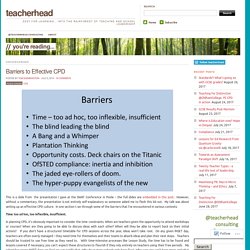
However, without a commentary, the presentation is not entirely self-explanatory so someone asked me to flesh this bit out. Professional Development: What should it look like? – Thinking Mathematically. A few weeks ago Michael Fenton asked on his blog this question: Suppose a teacher gets to divide 100% between two categories: teaching ability and content knowledge.
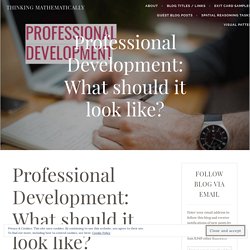
What’s the ideal breakdown? The question sparked many different answers that showed a very wide range of thinking, from 85%/15% favouring content, to 100% favouring pedagogy. In general though, it seems that more leaned toward the pedagogy side than the content side. While each response articulated some of their own experiences or beliefs, I wonder if we are aware of just how much content and pedagogical knowledge we come into this conversation with, and whether or not we have really thought about what each entails? Effective Staff Development. This FE Associates' article first appeared in FE News on April 3, 2017.
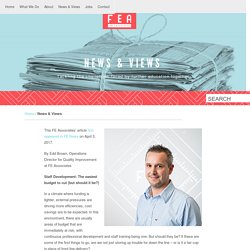
By Edd Brown, Operations Director for Quality Improvement at FE Associates Staff Development: The easiest budget to cut (but should it be?) In a climate where funding is tighter, external pressures are driving more efficiencies, cost savings are to be expected. The challenges of sustaining joined-up CPD. When coordinating a whole-school development cycle for all staff to get behind, there are several common pitfalls to be aware of.

This year I have written online materials and organised workshops for Optimus on the thorny issue of joining up continuing professional development (CPD) cycles with other aspects of development, to create a sustainable model for improvement in teaching and learning. I have met a range of senior and middle leaders from schools and colleges in an effort to establish what is working and what isn't.
The following are some common pitfalls that have become apparent from our conversations. Connecting the dots Observations, appraisals, CPD, coaching, mentoring and learning walks often evolve organically under different senior management teams, at different times in a school’s history. In some schools, appraisal does not involve a focus on what was developed after the lesson observation. Teaching for Distinction @OldhamCollege.
The most exciting job I’ve had since starting out with Teacherhead Consulting has been working with Oldham College.
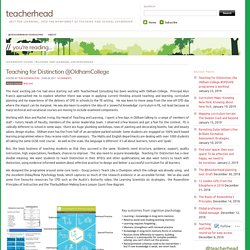
Principal Alun Francis approached me to explore whether there was scope in applying current thinking around teaching and learning, curriculum planning and my experience of the delivery of CPD in schools to the FE setting. He was keen to move away from the one-off CPD day where the impact can be marginal. He was also keen to explore the idea of a ‘powerful knowledge’ curriculum in FE, not least because so many technical and vocational courses are moving to include examined components.
Working with Alun and Rachel Irving, the Head of Teaching and Learning, I spent a few days in Oldham talking to a range of members of staff – tutors, Heads of Faculty, members of the senior leadership team. Developing Disciplined Inquiry. 30 June 2017 Back in 2014, at the national resesearchEd conference, in London, Dylan Wiliam talked about ‘Why teaching will never be a research-based profession (and why that’s a Good Thing)‘.
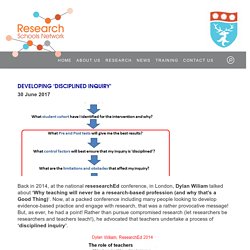
Now, at a packed conference including many people looking to develop evidence-based practice and engage with research, that was a rather provocative message! But, as ever, he had a point! Rather than pursue compromised research (let researchers be researchers and teachers teach!) , he advocated that teachers undertake a process of ‘disciplined inquiry’. At Huntington School, we have developed our own model of ‘disciplined inquiry’ (our own interpretation of the notion) that we think has helped us sharpen our practice and consider assessment and evaluation much more thoroughly. CPDL at Canons in 2016/17. This year at Canons, our People & Professionalism Team took the bold step of making all our non-departmental, non-year team meetings optional to staff.
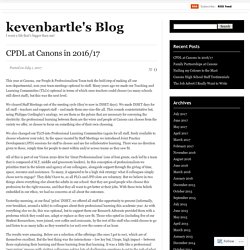
Many years ago we made our Teaching and Learning Communities (TLCs) optional in terms of which ones teachers could choose (so many schools still direct staff), but this was the next level. We cleared Staff Meetings out of the meeting cycle (they’re now in INSET days). We made INSET days for all staff – teachers and support staff – and made them one-size-fits-all. This sounds counterintuitive but, using Philippa Cordingley’s analogy, we see them as the pylons that are necessary for conveying the electricity: the professional learning between them are the wires and people at Canons can choose from the variety we offer, or choose to focus on something else of their own choosing. We also changed our TLCS into Professional Learning Communities (again for all staff, freely available to choose whatever your role).
The results were amazing. Assessment for Teacher Learning: Making CPD responsive – CEM Blog. By David Weston Here’s the big idea – teachers can only improve their practice when they also improve their ability to assess.
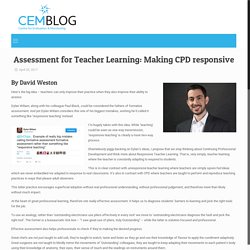
Dylan Wiliam, along with his colleague Paul Black, could be considered the fathers of formative assessment. And yet Dylan Wiliam considers this one of his biggest mistakes, wishing he’d called it something like ‘responsive teaching’ instead. I’m hugely taken with this idea. CPD Standards. CPD Standards- guidance. This other Eden: On INSET and CPD. This afternoon I attended a “World-Class Teaching Profession consultation event” run by the DfE and I learned something very useful indeed that could be crucial for any role that a possible, maybe never, ‘College for Teaching’ might have.

Those who attended this event were charged with the task of unpicking a variety of questions about Continuing Professional Development (CPD), Teaching Schools, a bit about a College for Teaching and how to ensure ‘great teaching’ takes place in classrooms up and down this sceptre’d isle, this earth of majesty, this England… Now, Methinks I am a prophet new inspired but there is a crucial difference between Continuing Professional Development and Inservice Training (Inset).
Making the most of INSET. CPD Planning. Making the most of your CPD day for professional learning. Many schools and colleges are still wedded to the model of a day each term where classes are cancelled and teachers are involved in staff development activities.
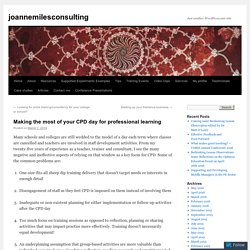
From my twenty-five years of experience as a teacher, trainer and consultant, I see the many negative and ineffective aspects of relying on that window as a key focus for CPD. Some of the common problems are: One-size-fits-all sheep dip training delivery that doesn’t target needs or interests in enough detailDisengagement of staff as they feel CPD is imposed on them instead of involving themInadequate or non-existent planning for either implementation or follow-up activities after the CPD dayToo much focus on training sessions as opposed to reflection, planning or sharing activities that may impact practice more effectively.
Training doesn’t necessarily equal development! An underpinning assumption that group-based activities are more valuable than individual or paired ones. DevelopingGreatTeachingReport 10.30-10.45 Break. 5 Things to Suggest at Your Next Conference. A recent education conference I attended had a packed schedule: multiple sessions, lunch in a large common meeting area, and additional sessions afterward. By the end of the day, I was exhausted. I had been networking and constantly connecting with others, which had made me feel disconnected from myself. It’s not that the conference was bad; it was amazing. However, it was also exhausting for me as an introvert to function in this space.
AfL Inset. I am Assessment Coordinator and Form 2 Tutor at St Hilda’s, and also teach MFL throughout the Lower School. I joined St Hilda’s in September 2013, having completed my PGCE at the Institute of Education. I enjoy communicating with others in the profession and I am always looking to share good practice, and gain valuable feedback. I look forward to continuing my journey as a teacher and being a part of TeachAldenham. At the start of the Autumn term, I ran INSET training on AfL. I’m too good for this CPD. – All Ears. I’m great at behaviour management. I rarely have any issues, and, on those rare occasions when I do, I know how to write the appropriate level of sanction into a student planner and record that I have done so in 8 different computer systems.
Making CPD meaningful. Dave Scott – 6x World Ironman champion. Dave Scott is a 6 times winning world Ironman triathlete who left nothing to chance. During peak training you could catch him cycling 75 miles, swimming a few 1000 metres and running up to 20 miles on a daily basis for weeks on end. In order to win six world championships he continued to reflect on his training and make tweaks to it in order to achieve optimal performance (much like the British cycling team under Sir David Brailsford – searching for a series of small marginal gains which would combine to produce a larger impact on performance).
CPD – Now it’s personal… Last year, I was fortunate enough to work with science teacher Bex Owen – helping her to reflect on and plan her own CPD. Bex discussed this at 15 minute forum earlier in the year – you can read about it here. What's going wrong? Surprising findings of CPD study. CPD and your subject. The more we tell teachers about generic best practice in the classroom, the less they will focus on students’ learning, says David Weston. Subject Knowledge Enhancement. How do you develop a strong learning culture amongst staff? A Teacher-Powered Approach to Professional Development. DIY Teaching CPD. How we teach is a complex mix of our values, context and emotions.
It is deeply influenced by our knowledge, understanding and beliefs about pedagogy, our subject and what is of value to learn. No two teachers are likely to be the same. Reclaiming Professionalism. Teachers taking responsibility for their own CPD. November has been an interesting month for me. As a company we have attended, hosted and sponsored over 25 events. A bottom-up approach to CPD is ‘best’ Getting to the heart of teacher led CPD. Becoming A Better Teacher: Teachers Doing It For Themselves. “Every teacher needs to improve, not because they are not good enough, but because they can be even better.” Putting the ‘Professional’ in Professional Development.
This guest post written by Jon Tait @TeamTait. Joey Bagstock. DevelopingandSupportingExpertFETeachers. CIPD Podcasts. What can Learning and Development do to increase peoples enjoyment of work? Professional development- the next level. In-school CPD: Busting the trial of Sisyphus. Sutton-Gates Summit Part 1. Sutton-Gates Summit Part 2. Reclaiming Pedagogy. CPD and the Second Law of Thermodynamics. Professional Learning. Every Teacher Can Improve. CPRd.
Opening The Door On Our 'Craft Knowledge' Dylan Wiliam: 'Every Teacher Can Improve' How to Create Outstanding CPD. New Models of CPD. The key to good CPD? Inconsistency. 'The Butterfly Effect' in Schools. The L&D world is splitting in two. Unleashing Greatness in Teachers. One size does not fit all. Exceptional CPD. 5 dos and 5 don'ts. CPD Components. The key tenets to successful whole-school CPD. Abandoning the deficit model of teacher development. Ensuring your school's CPD programme is effective. Appraisal can help improve T&L?! Leading CPD Effectively. Linking performance management to CPD. What’s PD got to do with it? Barriers to Effective CPD. Being the 1% – what does it take to make CPD effective? Cultivating a Climate for Contagious Pedagogy. Re-shaping Teaching & Learning. Requires Improvement. Guskey's 5 levels. Evaluating Professional Development.
Changing your approach to ensure high-impact CPD. Impact Evaluation Ideas. How to effectively evaluate our CPD. 5 Essentials for Effective Evaluation. Evaluation of CPD Impact. 5 ways to measure return on engagement. Evaluating CPD PDF. Evaluating CPD? Forget Trip Advisor. How To Plan Better Professional Development. How should we evaluate CPD? The Jerusalem and Babylon of Professional Development.
Digital Espressos: Short blasts of inspiration. Learning In The Cloud. Productive PD: Learning by Doing. Street Wisdom. Communities of practice. 50 T&L Secret Mission Cards. Sharing Best Practice with CPD Loyalty. TeachMeets and the Super Heroes of Education. How do your develop your teaching practice best? Teaching and Learning Leaders. Tweeting for teachers.